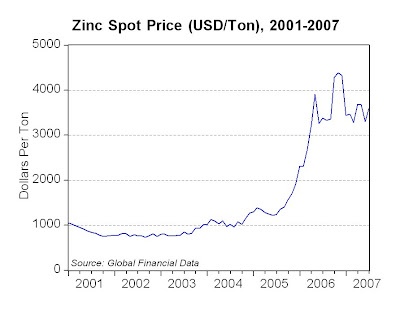Decision-Making: Private vs. Public Sector
 Suppose a private company had an opportunity to save $100 million annually by switching to a lower cost input without adversely affecting the quality of the final product. The switch would typically happen without hesitation. That's the definition of a "no-brainer."
Suppose a private company had an opportunity to save $100 million annually by switching to a lower cost input without adversely affecting the quality of the final product. The switch would typically happen without hesitation. That's the definition of a "no-brainer."Suppose a government has an opportunity to save taxpayers $100 million annually by making coins (like pennies) with low-priced steel instead of making those coins with high-priced zinc (currently about 5 times the cost of steel), following Canada, U.K. and Europe, which have all made the switch to steel for their coins. The U.S. government deliberates what should be a "no-brainer," and takes no action. I guess that's called "politics" or maybe "no brains."
According to a Forbes article, "With the price of zinc soaring amid a worldwide commodities boom (up +400% since 2003, see chart above), it costs the government almost 2 cents to make each 1-cent coin - a pretty penny considering roughly 8 billion new ones are placed into circulation annually."
Now, who would you predict is most aggressively resisting the switch from zinc to steel for making pennies, saving taxpayers $100 million every year? As Walter Williams would say, if your answer is "the company that supplies zinc to the U.S. government for making pennies," you can go to the head of the class.
And that company is the Jarden Corporation (NYSE:JAH), whose stock has done quite well lately, much better than the rest of the market over the last 5 years, see chart below of Jarden (blue) vs. the S&P500 (red).
Another perfect example of how a well-organized, special interest group engages in lobbying and "rent-seeking" to hijack the political process in its favor, at the expense of the "rationally ignorant" voters/taxpayers. As H.L. Mencken pointed out, it's like "two foxes (the zinc lobby and Congress) and a chicken (voters/taxpayers) taking a vote on what to eat for lunch."


2 Comments:
This is the best post I've read today. Evidencing the clear silliness of government in a simple way does more than any theoretical--even if logical--hypothetic can do. This type of thing should be mandatory reading in UM's "public policy" school...although it's doubtful that it will be.
If pennies didn't have zinc in them, I wouldn't eat them anymore.
Post a Comment
<< Home